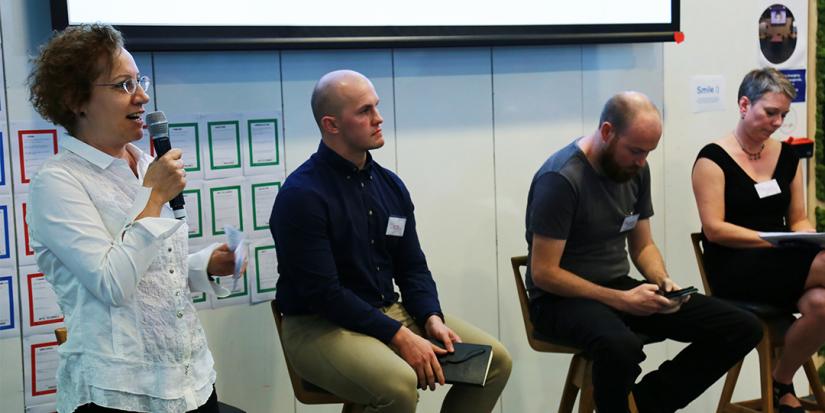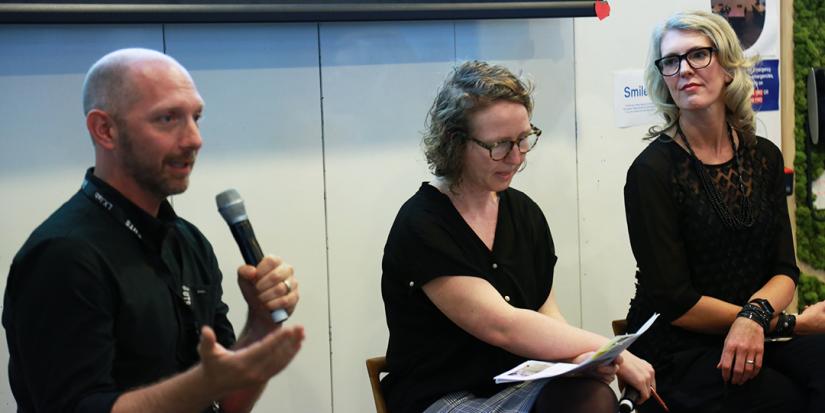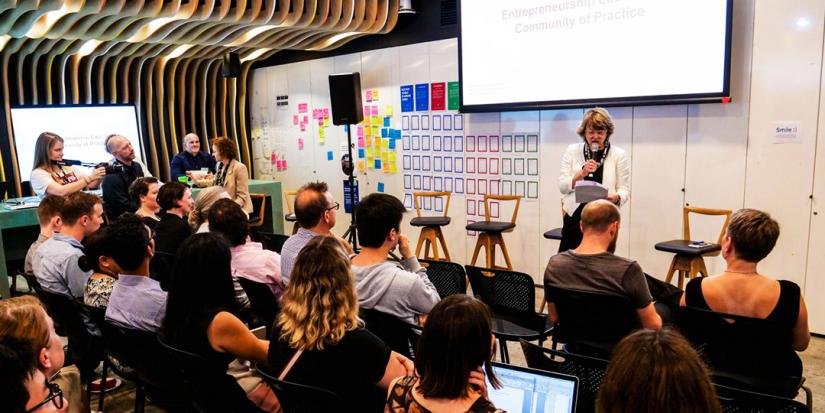
Panel members debate the role of education in entrepreneurship. L-R: Dilek Cetindamar Kozanoglu, Tyler Key, Shaun Bettridge, Joanne Jacobs. Photo by Liam Kennedy.
Can entrepreneurship be taught? This is the very question leading UTS academics came together to discuss in a panel debate and discussion hosted by the UTS’ Division of Education and Students and the UTS Innovation and Entrepreneurship Unit.
Hosted at the LX.lab as part of the UTS Entrepreneurship Education Community of Practice, the event came as discussions increasingly turn to the role formal education has in nurturing the entrepreneurial spirit.
Moderating a debate on whether entrepreneurship can in fact be taught, Shirley Alexander, Deputy Vice-Chancellor and Vice-President (Education and Students), kicked off the event by noting the importance of an entrepreneurial skillset for graduates.
“When it comes to the future of work, there is a glaringly obvious need for our students to develop entrepreneurial skills, but can we actually teach entrepreneurship?”
Making the case: Can entrepreneurship be taught?
First to take the floor for the negative was Associate Professor Dilek Cetindamar Kozanoglu of the Faculty of Engineering and IT, who argued entrepreneurs were “born”, not made.
Striking back for the affirmative, Shaun Bettridge drew on his experience teaching entrepreneurship with the Faculty of Engineering and IT, and as a startup founder, to make the case for entrepreneurship education.
“A lot of teaching comes from experience. Our job as teachers is to put people into experiences that they’re going to get something out of,” he said.
As the second speaker for the negative, Tyler Key, Associate Lecturer with the Faculty of Transdisciplinary Innovation, invoked the power of practical experience in nurturing successful entrepreneurship.
“Entrepreneurship is being able to iterate and validate awesome ideas. But unless you experience it in the real world, you’re not going to get anywhere,” he said.
Concluding the case for the affirmative, Joanne Jacobs, Senior Lecturer and Entrepreneur in Residence with the Faculty of Arts and Social Sciences, reminded audience members of the power universities had to shape the founders of the future.
“No successful entrepreneur in history has relied only on their own advice. The way we teach entrepreneurship has changed dramatically. We are having much more in the way of placement-oriented entrepreneurship teaching. Universities are not fake environments at all. These are real spaces with real businesses,” she said.
Following the conclusion of arguments, it was the role of three expert judges, Margaret Maile Petty (UTS Innovation and Entrepreneurship), Susanne Pratt (Faculty of Transdisciplinary Innovation) and Jochen Schweitzer (UTS Business), to decide on a winning team – with the team pro-entrepreneurship education emerging the victors.
Entrepreneurship in universities: creative spaces
Shirley Alexander then posed some important questions about the university’s role in the entrepreneurial journeys of students, asking the expert panel to discuss what the university already offers and what they would like to see the university do to scale entrepreneurship offerings.
“Instead of making things compulsory, we need to create more opportunities, catering to students with different ways of thinking. When you bring those people together, that’s when you get an exponential innovation outcome,” Margaret explained.

L-R: Jochen Schweitzer, Susanne Pratt and Margaret Maile Petty. Photo by Liam Kennedy.
Jochen highlighted the importance of existing curricular entrepreneurial subjects across different degrees and faculties in aiding a pivot towards issuing more graduates with entrepreneurial skills.
“We’ve catered a lot to the big end of town over the last 30 years. We’ve not catered enough to small business or startup entrepreneurs. There’s a lot more we can do to incorporate an entrepreneurial muscle into our teaching,” he said.
Reflecting on how the university could encourage entrepreneurs going forward, many of the panellists emphasised the importance of collaborative spaces in teaching entrepreneurship.
“What really seems to work is creating that physical space where students can come together to work on a project. It creates a community of entrepreneurial thinkers,” Jochen explained.
Susanne Pratt meanwhile made the case for a combination of classroom theory and real-world experiences, such as those provided under the Startup Internships program.
“What works is introducing students to the tools and processes for creative thinking, understanding opportunities and really critical questioning. Then internships or work placements really help bring together a lot of those ideas.”
Picking up the thread on the physical space teaching model, Margaret pointed to the growing UTS Startups community.
“What we’re trying to do with UTS Startups is create a real space and real environment for real entrepreneurs. They may fail, but they’re also going to learn, and that’s what it’s all about.”
Entrepreneurship in universities: flexible degrees
Finally, panellists and the audience were asked about what they would change about the university to prioritise entrepreneurship education.
Many made a point of changing degree structures and making learning opportunities more accessible.
“There’s something fantastic about having the space to tinker and play. It would be great to have those spaces where students could prototype and validate. Those resources are often locked away from many students,” said Susanne.
Jochen argued that students needed more freedom over what they studied.
“Our programs have to be more open, and accessible for everyone to do anything that might constitute a degree,” he said.
A future for entrepreneurship education: Academics in Residence
With an ongoing commitment at UTS to providing entrepreneurship experiences to the whole university community, the event also provided a suitable forum for the welcoming of the LX.lab’s latest Academic in Residence team.

Shirley Alexander addresses the audience. Photo by Matthew Vella.
The program connects UTS academics with the LX.lab for six months, a period for which both parties collaborate on projects to improve educational practice.
The latest iteration of the program will see the resident academic team - Jochen Schweitzer (UTS Business), Maya Marcus (UTS Innovation and Entrepreneurship), Martin Bliemel (UTS Transdisciplinary Innovation) and Julien Marchand (UTS Business) - work alongside the LX.lab to produce new entrepreneurship education resources for the UTS community.
Looking forward to the future of entrepreneurship at UTS, Shirley Alexander made the final point that providing room to experiment, fail and learn from mistakes would be the greatest contribution universities could make to the entrepreneurial ambitions of budding innovators.
The Community of Practice encourages knowledge sharing and collaboration between all UTS staff involved in entrepreneurship-related research, teaching, or programs. If you want to join us at the next Community of Practice, you can join the community here.
To view the full list of entrepreneurship opportunities at UTS visit entrepreneurship.uts.edu.au.

